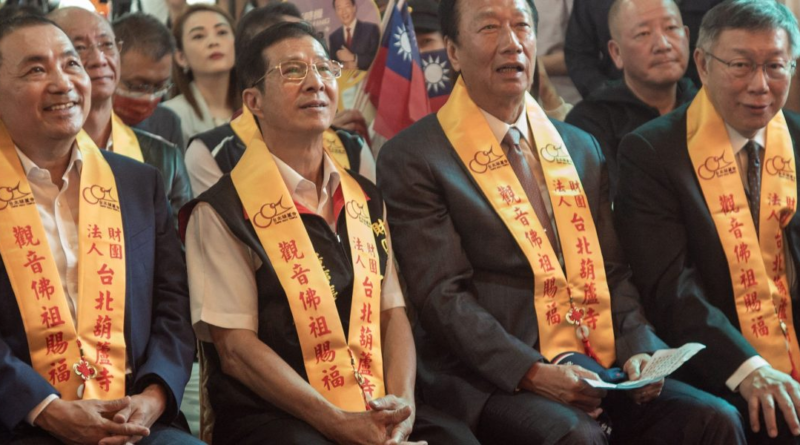Taiwan's opposition spent an hour publicly arguing over who will run for president. They can't decide—and the deadline to register is in under 24 hours
Taiwan’s presidential election is already chaotic—and that’s even before we know who the candidates will be. First, Foxconn founder Terry Gou shook the race by announcing his intention to run as an independent candidate. Then, the two most prominent opposition candidates agreed to join forces to oust the incumbent party, only for the alliance to be put on hold due to disagreements over polling numbers.
Then on Thursday, the three opposition candidates, along with former Taiwanese president Ma Ying-Jeou, held a rambling press conference, ostensibly to find some way to work together. After over an hour of public arguments and attempts to keep the peace by citing the U.S. holiday of Thanksgiving, there was still no agreement on what a joint presidential ticket would look like—and who would lead it—by Thursday evening local time. Beside them, a clock ticked down to 5:30pm local time on Friday Nov. 24, the deadline to officially register as a candidate.
Taiwanese voters will go to the polls on Jan. 13 to choose the next person to replace Tsai Ing-Wen, outgoing president and member of the Democratic Progressive Party which has been in power for eight years.
Taiwan is a self-governing democracy, yet Beijing regards the region as a breakaway province and a part of China. Mainland Chinese officials say they reserve the right to use force in the event Taiwan formally declares independence.
Taiwan is also a sticking point between the U.S and China. Chinese President Xi Jinping called Taiwan “the biggest, most potentially dangerous issue in U.S.-China relations,” during his meeting with U.S. President Joe Biden last week. Washington maintains links with the island, including selling its government arms for defense.
A conflict over Taiwan could have severe economic consequences. The island is a major production hub for advanced semiconductors and is home to one of the world’s most advanced foundries: Taiwan Semiconductor Manufacturing Company.
Here’s who’s hoping to lead Taiwan, one of the world’s most important geopolitical flashpoints:
The incumbent party
Taiwan’s vice-president, William Lai, is running to give the DPP its third straight term as the island’s ruling party. On the Taiwanese political spectrum, the DPP is tougher on China. On its party website, the DPP lists deepening democracy and safeguarding Taiwan’s sovereignty as part of its values.
Beijing deems Lai a “troublemaker” due to his past comments on independence. Taiwan’s vice-president has since walked back that stance. To Bloomberg, Lai said that Taiwan does not need formal sovereignty because, for all intents and purposes, the island already acts like an independent country. Yet he remains skeptical of Beijing, telling a U.S. audience that Taiwan will not be “scared nor cower” and will “uphold the values of democracy and freedom”.
China has a “very hardline approach towards the DPP, and particularly with Lai, because of some of his previous remarks,” says Ivy Kwek, a China and Taiwan analyst at International Crisis Group, a think tank. “If DPP wins, then China should really think about finding a way to actually have a dialogue with the DPP, because they’ve demonstrated that they are here to stay.”
A divided opposition
The DPP’s approval has slipped over the past year. The party lost heavily in local elections last November, as voters focused on domestic issues like the island’s response to the COVID pandemic. Yet Lai and the DPP are likely the frontrunners in January’s election, thanks to a divided opposition.
The Kuomintang—traditionally one of Taiwan’s two major political parties—is fielding Hou Yu-ih, the mayor of New Taipei City, which surrounds the capital Taipei. The popular city leader won re-election by a 25 percentage point margin last November. While Hou has not explicitly stated what his approach to China will be, he’s pushed for a mix of deterrence, dialogue and de-escalation while on the campaign trail. (The KMT has traditionally supported eventual unification with mainland China)
Yet the KMT is now challenged by a new party, the Taiwan People’s Party led by former Taipei mayor Ko-Wen Je. The party describes itself as sitting in between the more independence-leaning DPP and unification-leaning KMT. The TPP says its ideology is based on improving lives as opposed to being caught in ideological battles as the “key distinction between us and other political parties”.
Ko himself says he supports dialogue with China; he’s also promised no “surprises” for the U.S., and has also expressed wariness about TSMC’s plans to invest overseas. Yet the former mayor is also known for his frank and, at times, sexist comments, notes Bloomberg.
For months, the KMT and TPP have discussed running as a unity ticket to avoid splitting the opposition vote. The two parties have already agreed to cooperate in the legislative elections, also happening on Jan. 13.
Both Hou and Ko are still in negotiations about a joint presidential ticket. The two candidates shocked observers on Nov. 15 by announcing that they would run together, with the lead candidate determined by who was ahead recent polling—then the agreement almost immediately hit a stumbling block due to disagreements on how to understand the data.
Even if a joint ticket comes together, the chaos around its formation could disappoint opposition voters, who are hoping for a viable alternative to the DPP, says Hilton Yip, a Taiwan-based journalist and news analyst.
A tycoon wildcard
A billionaire candidate makes up the final unknown in Taiwan’s presidential race.
Earlier this year, Foxconn founder Terry Gou announced that he would run as an independent candidate, in a bombastic press conference where he said he was running to stop Taiwan becoming the “next Ukraine.” His next big announcement was his choice of running mate: actress Tammy Lai, who herself played a presidential candidate on the Taiwanese Netflix show Wave Makers.
This is Gou’s second shot at the presidency: In 2019, he attempted to run as a member of the KMT, but lost the presidential primary.
Gou promised “50 years of peace to the Taiwan strait” when he announced his presidential bid in August and also highlighted his expertise in business. In an op-ed for the Washington Post earlier this year, he called for new talks between China and Taiwan under the “One China” framing.
Foxconn, also known as Hon Hai Precision Industry, makes electronics for brands like Apple, Dell and Sony, and is the largest private employer in mainland China. Gou stepped down as Foxconn’s chair ahead of his previous shot at the presidency, and left the board entirely in September, though he still has a significant stake in the company; Gou claims he isn’t worried about Beijing pressuring him through his business ties.
For now, Gou seems set to be little more than a spoiler candidate: He has consistently come in fourth place in presidential polling.




